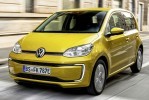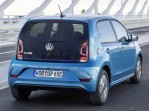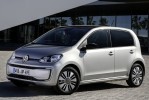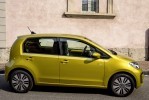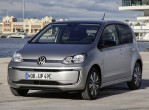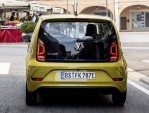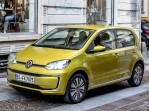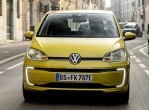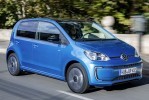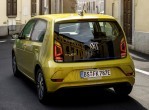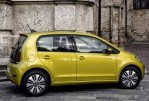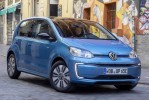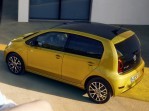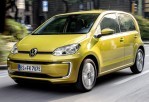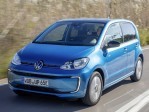Body style: Hatchback
Segment: Small
Production years: 2019, 2020, 2021, 2022, 2023, 2024
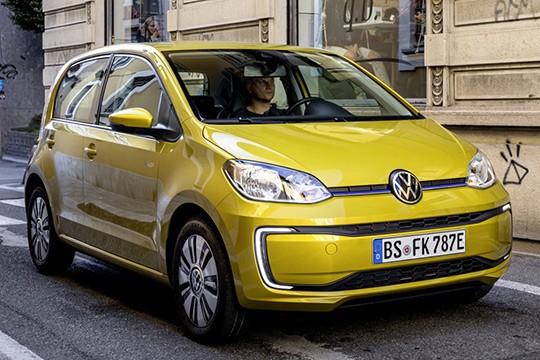 32 Photos
32 PhotosIn production relatively unchanged since 2013, the Volkswagen e-Up! received a rather substantial mid-cycle facelift in 2019. Part of a multi-billion euros electric vehicle offensive that also includes all-new cars from the ID. lineup, the refreshed e-Up! features a brand new battery, which offers increased range, and an even more competitive price compared to its predecessor. The visual enhancements are minimal, with the overall design language being largely identical to the old model.
The new Lithium-ion battery has a capacity that has been almost doubled, from 18.7 to 36.8 kWh, of which 32.3 kWh comprise usable energy. Thanks to an average energy consumption of around 12.9 kWh/100 km, the revamped VW e-Up! can achieve a range of up to 260 kilometers from a single charge. Using direct current from the optional CCS charging connection, the model can be recharged from 0 to 80 percent in a single hour. With alternative current from a 7.2 kW socket, the battery can be charged at the same 80 percent in a little over four hours. The e-Up! is powered by an electric motor that deliver 83 peak horsepower and 212 Nm of instant torque, which helps the car hit 100 kph (62 mph) from a standing start in 11.9 seconds. Top speed is electronically limited to 130 kph. No less than three different driving profiles and five energy recovery levels are available.
VOLKSWAGEN e-UP! 2019, 2020, 2021, 2022, 2023, 2024
- 32.3 KWh (83 HP)
VOLKSWAGEN e-UP!
32.3 KWh (83 HP)
ENGINE SPECS - 32.3 KWh (83 HP) | |
|---|---|
| Cylinders: | Permanently excited synchronous motor (PSM) |
| Power: | 61 KW @ 2800-12000 RPM 83 HP @ 2800-12000 RPM 82 BHP @ 2800-12000 RPM |
| Torque: | 156 lb-ft @ 2750 RPM 212 Nm @ 2750 RPM |
| Fuel System: | Electric |
| Fuel: | Electric |
PERFORMANCE SPECS | |
|---|---|
| Top Speed: | 81 mph (130 km/h) |
| Acceleration 0-62 Mph (0-100 kph): | 11.9 s |
TRANSMISSION SPECS | |
|---|---|
| Drive Type: | Front Wheel Drive |
| Gearbox: | 1-Speed automatic |
BRAKES SPECS | |
|---|---|
| Front: | Ventilated Discs |
| Rear: | Discs |
DIMENSIONS | |
|---|---|
| Length: | 141.7 in (3599 mm) |
| Width: | 64.8 in (1646 mm) |
| Height: | 56.3 in (1430 mm) |
| Front/rear Track: | 55.6/55.4 in (1,412/1,407 mm) |
| Wheelbase: | 95.2 in (2418 mm) |
| Cargo Volume: | 8.9 cuFT (252 L) |
| Aerodynamics (Cd): | 0.31 |
WEIGHT SPECS | |
|---|---|
| Unladen Weight: | 2557 lbs (1160 kg) |
| Gross Weight Limit: | 3373 lbs (1530 kg) |
POWER SYSTEM SPECS | |
|---|---|
| Power pack: | Lithium-Ion |
| Nominal Capacity: | 32.3 kWh |
| Charging time (normal): | 16 hours |
| Charging time (quick): | 1 hours |
| Range: | 162 miles (260.7 km) |
| Notes |
|---|
| Average energy consumption: 12.9 – 12.7 kWh/100 km Nominal voltage: 307 V AC charging time (2,3 kW) up to 100% SOC: 16h, 12 min DC charging time (50 kW) up to 80% SOC: 1h Range in practical conditions: 180 km - 260 km |

